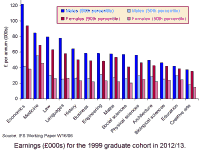Why Study Economics? is a website that encourages students from all educational backgrounds to study economics as their first degree. It also provides information to teachers and parents.
Where can students study economics? Over 95 departments across the UK offer an Economics degree. Some of these are straight (‘single’) Economics degrees. Normally they are simply called Economics, but sometimes they are more specialist, e.g. Agricultural Economics or Business Economics. Other degrees combine Economics with another subject (‘joint degrees’). The titles of these joint degrees includes: Economics and Management; Economics and Finance; Economics and Philosophy; Economics and Accounting; Economics and Business; Economics and History; and Economics and Politics.
What will economics students do at university? Most economics students will experience a generic first year at university which builds a solid foundation. The most important modules for a first-year economics student are Introductory Microeconomics, Introductory Macroeconomics and Quantitative Methods for Economics (statistics/mathematics). The concepts taught in these three modules will be used throughout an economics undergraduate degree. In their second, and particularly third, year at university, economics students will have a number of optional units. Students will be able to specialise in Development Economics, Managerial Economics, Labour Economics, Monetary Economics and so on. If students are on a joint degree they will have modules in their other subject in all three years, some of which will be compulsory. Students on either single or joint economics degrees may also be able to do an optional module in another subject area such as a modern language.
“Until studying a course like economics not a lot of people are aware of how the world works, including industries, businesses and governments. You realise that it’s very important to be educated in this type of thing even if it gets to the stage where you become annoyed with family and friends for moaning about taxes!”
The workload at university is generally heavier than at A-level. Students can expect around 10 – 15 hours of contact time a week, consisting of a mixture of lectures and tutorials/seminars/workshops. In addition to this, students will be expected to put in a minimum of 20 hours per week of independent study. The number of contact hours will normally fall between years one, two and three but the amount of independent study will rise (at least it should do!).
Why do students enjoy economics? Economics is the perfect combination of numbers and words, problems and essays, calculations and interpretations. It is both an art and a science subject. Students have the opportunity to build models which give insights into the real world, and then to critique these models on the basis of their assumptions. There is rarely a right answer in economics but any argument put forward must be backed up by quantitative evidence. Students ultimately enjoy economics because it allows them to employ and develop analytical and evaluative skills.
“My decision to pursue an Economics degree has been the single most valuable investment I have made to date. It sharpened my ability to critically assess information, deliver disciplined and well structured arguments and become a more confident team player.”
What do students need to have studied to read economics at university? (more…)

